Jeff Foote, STEM Skills Co-Course Director

Jeff Foote is an Assistant Professor of Practice at the University of Tennessee, where he manages the Kao Innovation & Collaboration Studio and teaches hands-on courses in advanced manufacturing. Before joining UTK, Jeff built a diverse career in structural analysis, product design, industrial robotics, commercial 3D printing, and prototype development. Today, he enjoys teaching these skills to undergraduate students, helping prepare the next generation of engineers and innovators.
In addition to his academic role, Jeff owns and operates a small consulting firm that specializes in highly customized hardware and software solutions across a range of industries and clients. He holds both a BS and MS in Mechanical Engineering from Tennessee Tech, is a registered Professional Engineer, and is a proud 1998 alumnus of the Governor’s School for the Sciences and Engineering at UTK.
Dr. Rachel Wood-Ponce, STEM Skills Co-Course Director
Rachel Wood-Ponce is a Teaching Assistant Professor in the Department of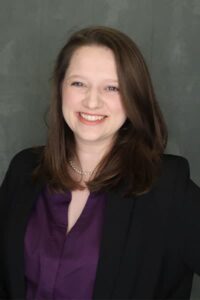 Industrial and Systems Engineering at the University of Tennessee Knoxville. She received her PhD and MS in Industrial Engineering from UTK. In addition to her research, she focused on gaining knowledge and experience in engineering education while in graduate school. Specifically, she took courses to contribute to an Engineering Education Certificate, which covered pedagogy, methodology, and practical application of teaching engineers, and taught three undergraduate classes in the IE department.
Industrial and Systems Engineering at the University of Tennessee Knoxville. She received her PhD and MS in Industrial Engineering from UTK. In addition to her research, she focused on gaining knowledge and experience in engineering education while in graduate school. Specifically, she took courses to contribute to an Engineering Education Certificate, which covered pedagogy, methodology, and practical application of teaching engineers, and taught three undergraduate classes in the IE department.
Dr. Kristina Gehrman, STEM in Society Course Director
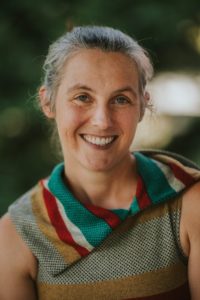 Dr. Kristina Gehrman is an Associate Professor of Philosophy at the University of Tennessee, Knoxville. She specializes in ethics and environmental philosophy, and she is especially interested in understanding the thoughts processes people use to make decisions. How do we solve moral dilemmas? Make major life decisions? Etc. And – could philosophy possibly help us to make better decisions? She received her PhD from UCLA.
Dr. Kristina Gehrman is an Associate Professor of Philosophy at the University of Tennessee, Knoxville. She specializes in ethics and environmental philosophy, and she is especially interested in understanding the thoughts processes people use to make decisions. How do we solve moral dilemmas? Make major life decisions? Etc. And – could philosophy possibly help us to make better decisions? She received her PhD from UCLA.
Dr. Stephanie Drumheller-Horton, Biology Course Director
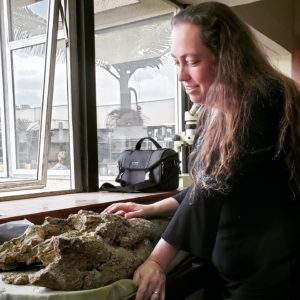 My research interests center on vertebrate taphonomy, ichnology, paleopathology, and paleoecology. In particular, I study bone surface modifications generated under modern and experimental conditions to better understand the processes which left similar traces on bone in the fossil record. My current research projects include:
My research interests center on vertebrate taphonomy, ichnology, paleopathology, and paleoecology. In particular, I study bone surface modifications generated under modern and experimental conditions to better understand the processes which left similar traces on bone in the fossil record. My current research projects include:
- testing methods for applying these modern analogies in a deep time perspective
- interpreting trophic interactions, behavior, and diet from bite marks left by different archosaurian groups, especially members of Crocodyliformes
- identifying and differentiating historically understudied traces and pathologies, such as bite marks vs. shell disease and different types of plant mediated damage to bone.
Dr. Doug Stuart, Chemistry Course Director
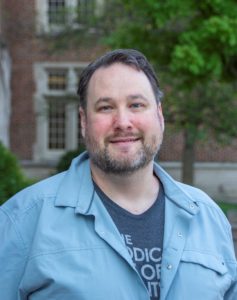
Dr. Stuart has a Masters in Literature from the University of Aberdeen, Scotland, and a PhD in Bioanalytical Chemistry from Indiana University Bloomington. He did postdoctoral research at Northwestern, and was a Professor at The University of West Georgia for over a decade before coming to UT in 2019 to be the Advanced Lab Director and Lecturer. He has done research using microscopy and spectroscopy to peer into cells, to develop new ways to image cancerous tissue, to design biochemical assays for biomarkers and DNA, and to investigate laser-based methods to detect chemical/ biological warfare agents and monitor glucose levels.
Dr. Remus Nicoara, Mathematics Course Director
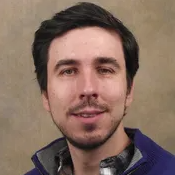 Dr. Remus Nicoara earned his Ph.D. in Mathematics from UCLA, and his Bachelor’s Degree from the University of Bucharest, Romania. He is currently a Professor of Mathematics and Director of the Math Honors Program at the University of Tennessee. His main research interest lies in von Neumann algebras, which are algebras of operators that model quantum mechanical systems. Outside of work, Remus likes to hike, bike and garden while thinking about math. He enjoys meditation, Sci-Fi books, and Hanayama puzzles. He is also an avid gamer and he currently teaches a class about video games and math, called Math Effect.
Dr. Remus Nicoara earned his Ph.D. in Mathematics from UCLA, and his Bachelor’s Degree from the University of Bucharest, Romania. He is currently a Professor of Mathematics and Director of the Math Honors Program at the University of Tennessee. His main research interest lies in von Neumann algebras, which are algebras of operators that model quantum mechanical systems. Outside of work, Remus likes to hike, bike and garden while thinking about math. He enjoys meditation, Sci-Fi books, and Hanayama puzzles. He is also an avid gamer and he currently teaches a class about video games and math, called Math Effect.
Dr. Haidong Zhou, Physics Course Director
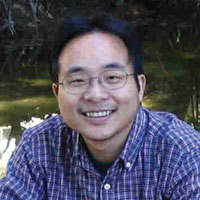 Haidong Zhou is a professor in the Department of Physics and Astronomy at UTK. Haidong obtained his PH.D. in Physics in December 2005 from University of Texas at Austin. He joined the Physics Department at UTK in August 2012. He was promoted to be full professor at UTK in 2023. He became a Postdoctoral Associate at National High Magnetic Field Lab/Florida Sate University with Prof. C. R. Wiebe. In August 2008, he obtained a position as assistant scholar/scientist in NHMFL. He became an Assistant Professor in the Physics Department at UTK in August 2012.
Haidong Zhou is a professor in the Department of Physics and Astronomy at UTK. Haidong obtained his PH.D. in Physics in December 2005 from University of Texas at Austin. He joined the Physics Department at UTK in August 2012. He was promoted to be full professor at UTK in 2023. He became a Postdoctoral Associate at National High Magnetic Field Lab/Florida Sate University with Prof. C. R. Wiebe. In August 2008, he obtained a position as assistant scholar/scientist in NHMFL. He became an Assistant Professor in the Physics Department at UTK in August 2012.
Haidong’s research is concerned with the nature of phase transitions in condensed matter systems, especially strongly correlated systems and quantum matters. More specifically, he is involved with the single crystal growth and using the x-ray scattering, low temperature and high magnetic field measurements, and neutron scattering, as complementary probes to study the spin, electron and structure of solids. His research interests are:
- Single crystal growth
- Geometrically frustrated magnets (GFM)
- Multiferroic systems
- Systems with strong spin/orbital/lattice coupling
- Systems approaching the itinerant electron limit
Dr. Gary Null, Industrial & Systems Engineering Course Director

Dr. Gary Null is an Assistant Professor of Practice in Industrial and Systems Engineering (ISE). He teaches ISE, Engineering Management, and the (Ralph) Heath Integrated Business and Engineering Program (IBEP) courses.
Prior to joining the University of Tennessee, he taught various MBA, quantitative studies, operations management, and engineering courses. He received his Ph.D. in Systems and Engineering Management from Texas Tech University. He received his MS in Mechanical Engineering from the Naval Postgraduate School, his MBA from the University of Colorado, and his BS in Systems Engineering from the US Naval Academy. He is also a certified Lean Six Sigma Master Black Belt and a Design Thinking facilitator and coach.
Mary Kocak, Materials Science & Engineering Course Director
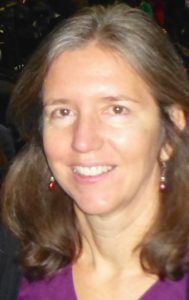 Mary Kocak earned her Master of Science in Mechanical Engineering from North Carolina State University and her Bachelor of Science in Mechanical Engineering from the University of Kentucky. She is currently a full-time professor in the Department of Engineering and Media Technologies at Pellissippi State Community College and an adjunct instructor in the Tickle College of Engineering at the University of Tennessee. Mary started her career in a manufacturing position, progressed to an international consulting firm that specialized in the physical protection of industrial and commercial properties against fire, explosion, earthquake, collapse, and windstorm damage, and transitioned to faculty appointments at the university and community college levels. Courses that she teaches include Materials and Manufacturing Processes, Mechanics, Strength of Materials, Fluid Mechanics and Thermodynamics.
Mary Kocak earned her Master of Science in Mechanical Engineering from North Carolina State University and her Bachelor of Science in Mechanical Engineering from the University of Kentucky. She is currently a full-time professor in the Department of Engineering and Media Technologies at Pellissippi State Community College and an adjunct instructor in the Tickle College of Engineering at the University of Tennessee. Mary started her career in a manufacturing position, progressed to an international consulting firm that specialized in the physical protection of industrial and commercial properties against fire, explosion, earthquake, collapse, and windstorm damage, and transitioned to faculty appointments at the university and community college levels. Courses that she teaches include Materials and Manufacturing Processes, Mechanics, Strength of Materials, Fluid Mechanics and Thermodynamics.
Mary’s research experiences include thermal contact conductance of materials at high temperatures, landfill gas as an alternative fuel for industrial boilers, alternative energy methods for the desalination of salt water, advanced manufacturing and prototyping, and the integration of novel metal alloys in the field of die-casting. In her many collaborations, she has worked with diverse teams of engineers and she looks forward to sharing the relevance of material science to students of all engineering disciplines.
Dr. Dustin Gilbert, Materials Science & Engineering Course Director
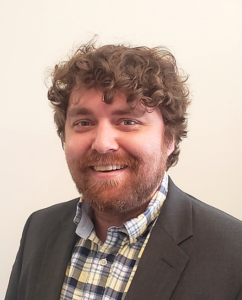
Dustin Gilbert is an Associate Professor in the Materials Science and Engineering Department, at the University of Tennessee. He received his Ph.D. in Physics from the University of California in Davis in 2014 and was an NRC postdoctoral fellow at the NIST Center for Neutron Research before joining the faculty at the University of Tennessee in 2018. Prof. Gilbert conducts research on nanoscale systems with an emphasis on magnetic materials and spin phenomenon. This research has included magnetic skyrmions, hard drive materials, biomedical materials, ultralight metamaterials, materials for microwave defense applications, magneto-ionic systems, and high entropy alloys and oxides, as well as fundamental research into proximity effects and hysteretic reversal processes..